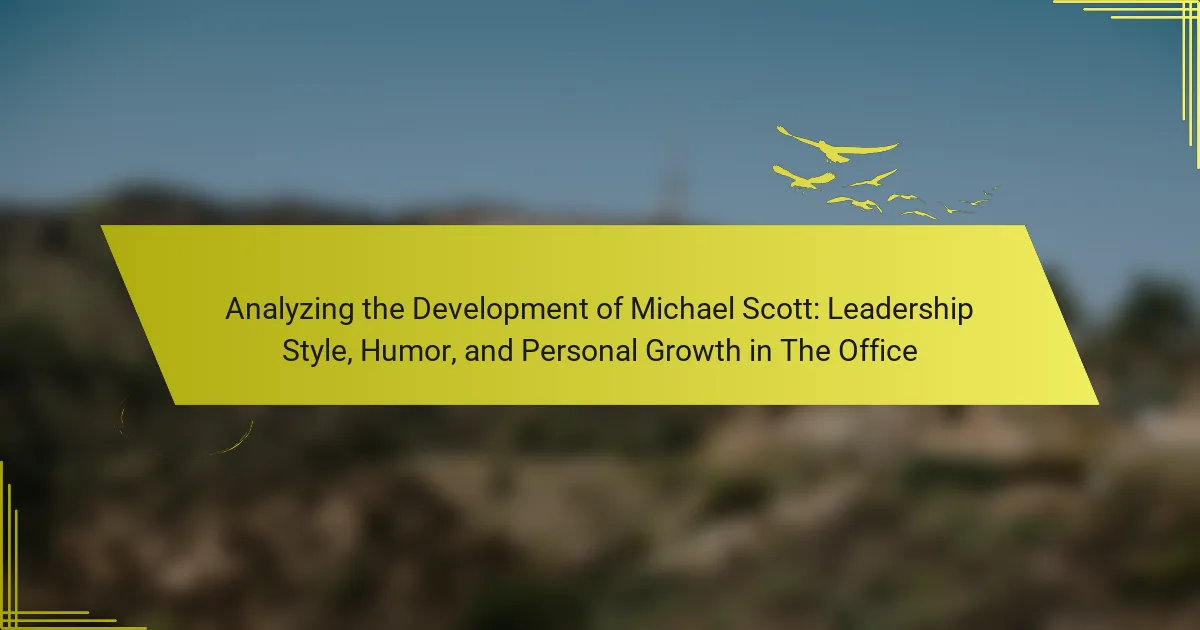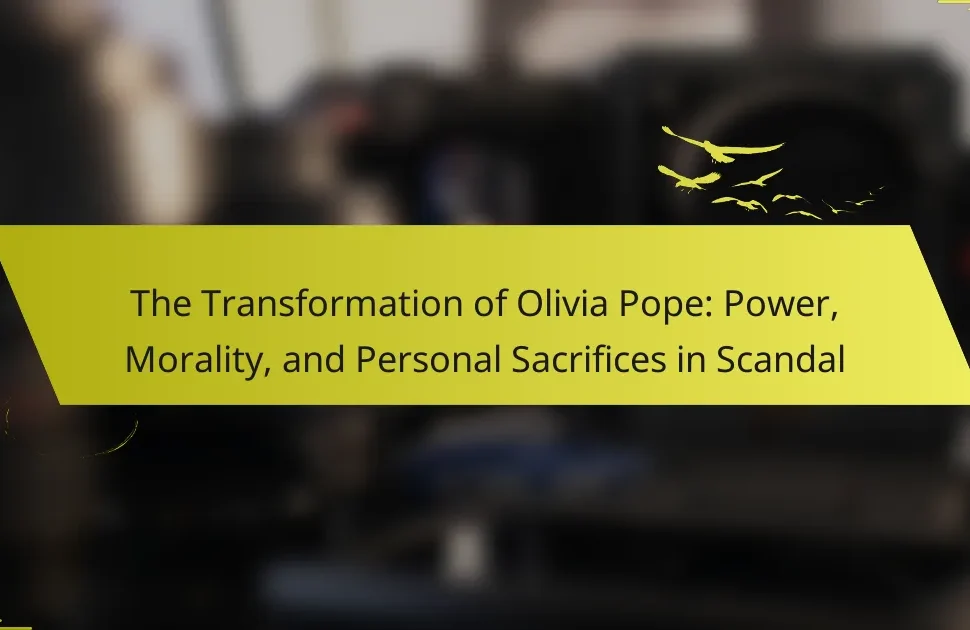Michael Scott is the central character analyzed in this article, focusing on his development throughout the series The Office. The article examines his evolution in leadership style, highlighting his transition from seeking validation to embracing empathy and respect. It also explores the changes in his humor, moving from inappropriate jokes to more relatable and heartfelt interactions. Additionally, the article discusses the deepening of his personal relationships with characters like Jim, Pam, and Dwight, illustrating his capacity for genuine connection. By the end of the series, Michael Scott’s character reflects significant personal growth and a mature understanding of his role as a leader.

What are the key elements of Michael Scott’s character development in The Office?
Michael Scott’s character development in The Office includes his growth in leadership, humor, and personal relationships. Initially, Michael exhibits a lack of self-awareness and often seeks validation from his employees. Over time, he learns the importance of empathy and teamwork. His leadership style evolves from being overly focused on being liked to understanding the value of respect. Michael’s humor transitions from inappropriate jokes to more relatable and heartfelt moments. His relationships with characters like Jim, Pam, and Dwight deepen, showcasing his capacity for genuine connection. By the series’ end, Michael demonstrates significant personal growth, reflecting a more mature understanding of his role as a leader.
How does Michael Scott’s leadership style evolve throughout the series?
Michael Scott’s leadership style evolves from immature and self-centered to more empathetic and effective. In the early seasons, he often prioritizes humor over professionalism. His need for approval leads to misguided decisions that alienate employees. As the series progresses, he begins to understand the importance of team dynamics. He learns to listen to his employees and values their input. This shift is evident in later seasons, where he fosters a supportive work environment. His character development culminates in a more mature leadership style, balancing humor with genuine care for his team.
What are the defining traits of Michael Scott’s initial leadership approach?
Michael Scott’s initial leadership approach is characterized by a lack of professionalism and an emphasis on personal relationships. He often prioritized being liked over being respected. This resulted in a casual work environment. Michael frequently used humor to connect with his employees. However, his jokes sometimes crossed professional boundaries. His decision-making was often impulsive and lacked strategic thinking. He relied heavily on motivational speeches, despite their ineffectiveness. Overall, Michael’s leadership style was more focused on friendship than on effective management.
How do his leadership decisions impact the Dunder Mifflin team?
Michael Scott’s leadership decisions significantly impact the Dunder Mifflin team. His approach fosters a unique workplace culture. He often prioritizes employee happiness over productivity. This creates a relaxed atmosphere that encourages creativity. However, it can also lead to inefficiencies. For instance, his lack of focus on performance metrics affects sales outcomes. Employees feel valued due to his personal investment in their lives. This boosts morale and team cohesion. Overall, his leadership style shapes both the dynamics and effectiveness of the Dunder Mifflin team.
In what ways does Michael’s leadership style reflect his personal insecurities?
Michael’s leadership style reflects his personal insecurities through his need for approval and fear of rejection. He often seeks validation from his employees, using humor to mask his vulnerabilities. This behavior stems from his desire to be liked, leading to unprofessional decisions. His tendency to avoid conflict showcases his fear of confrontation. Additionally, Michael’s overcompensation through excessive enthusiasm indicates a lack of self-confidence. He frequently tries to establish personal connections to cover his insecurities. These traits culminate in a leadership style that is more about personal acceptance than effective management.
What role does humor play in Michael Scott’s character?
Humor is a central aspect of Michael Scott’s character in “The Office.” It serves as a coping mechanism for his insecurities. Michael often uses humor to connect with his employees. This approach is intended to foster a sense of camaraderie. However, his humor frequently crosses boundaries, leading to uncomfortable situations. It reflects his desire for acceptance and approval. Michael’s comedic style is often awkward and misguided, highlighting his lack of social awareness. Nonetheless, his humor can also create memorable moments that enhance workplace dynamics. Overall, humor is both a tool for connection and a source of conflict in Michael Scott’s character.
How does Michael’s use of humor affect his relationships with colleagues?
Michael’s use of humor positively affects his relationships with colleagues. His humor creates a relaxed atmosphere in the workplace. Colleagues often feel more comfortable around him due to his lightheartedness. This approach fosters camaraderie among team members. Humor also serves as a coping mechanism during stressful situations. It helps to diffuse tension and resolve conflicts. For example, Michael’s jokes can lighten the mood during serious meetings. Overall, his humor enhances team cohesion and boosts morale.
What are the implications of Michael’s comedic style for workplace dynamics?
Michael’s comedic style significantly impacts workplace dynamics by fostering both camaraderie and discomfort. His humor often breaks down barriers, creating a more relaxed atmosphere among employees. This can lead to increased collaboration and team bonding. However, his inappropriate jokes sometimes create tension and discomfort, affecting morale negatively. For instance, Michael’s tendency to prioritize humor over professionalism can undermine authority and lead to misunderstandings. Ultimately, his comedic approach serves as a double-edged sword, enhancing relationships while risking professionalism and respect within the office.
How does humor serve as a coping mechanism for Michael Scott?
Humor serves as a coping mechanism for Michael Scott by allowing him to navigate social awkwardness and personal insecurities. He often uses jokes to deflect tension in uncomfortable situations. This behavior reflects his desire to be liked and accepted by his peers. Michael’s humor also serves to mask his vulnerabilities, particularly regarding his leadership abilities. For example, he frequently resorts to comedic antics during stressful office moments. This approach helps him maintain a façade of confidence. Furthermore, humor fosters camaraderie among his employees, creating a more relaxed work environment. The use of humor ultimately illustrates his struggle for connection and validation within the office dynamics.
In what ways does Michael Scott experience personal growth?
Michael Scott experiences personal growth through increased self-awareness and improved leadership skills. Initially, he often prioritizes his desire for friendship over professional responsibilities. As the series progresses, he learns to balance personal connections with workplace professionalism. His relationships with employees, particularly with Pam and Jim, evolve, showcasing his capacity for empathy and understanding. In later seasons, he demonstrates a better grasp of his impact on others. He becomes more supportive and recognizes the importance of teamwork. His decision to leave Dunder Mifflin for a healthier personal life reflects significant growth. These developments highlight his journey from a self-centered manager to a more mature leader.
What significant events contribute to Michael’s character development?
Michael Scott’s character development is significantly influenced by various key events throughout “The Office.” His promotion to Regional Manager at Dunder Mifflin marks the beginning of his leadership journey. This role exposes Michael to the challenges of managing employees and navigating office dynamics.
Another pivotal event is the company-wide downsizing, which forces Michael to confront his insecurities and the realities of leadership. His relationship with Pam and Jim evolves as he learns to balance professionalism with friendship.
Additionally, Michael’s decision to leave Dunder Mifflin for a new job showcases his growth and desire for personal fulfillment. His journey through love, particularly his relationship with Holly, highlights his emotional development.
Each of these events contributes to Michael’s understanding of leadership, relationships, and his own identity, ultimately shaping him into a more rounded character.
How do Michael’s relationships influence his personal growth journey?
Michael’s relationships significantly influence his personal growth journey by providing him with emotional support and feedback. His interactions with colleagues shape his understanding of leadership and empathy. For instance, Michael’s bond with Pam and Jim fosters his ability to connect with others. Their encouragement helps him realize the importance of teamwork. Additionally, his conflicts with characters like Toby challenge him to reflect on his behavior. These experiences contribute to his development as a more self-aware leader. Over time, Michael learns to balance humor with sensitivity, improving his relationships and personal growth.
What lessons does Michael learn by the end of the series?
Michael learns the importance of empathy and personal connections by the end of the series. He realizes that leadership is about understanding and supporting his employees. Michael also understands the value of teamwork and collaboration. He learns to appreciate the diverse strengths of his team members. Additionally, he grasps the significance of personal growth and self-awareness. By the series finale, Michael acknowledges his own flaws and seeks to improve himself. These lessons culminate in his decision to leave Dunder Mifflin for the sake of his employees’ well-being. Ultimately, Michael’s journey emphasizes the balance between professional success and personal relationships.
How do Michael Scott’s attributes as a leader compare to other characters in The Office?
Michael Scott’s attributes as a leader are characterized by his emotional intelligence and desire for approval. He often prioritizes personal relationships over business efficiency. In contrast, characters like Dwight Schrute exhibit a more authoritarian leadership style focused on rules and structure. Jim Halpert showcases a more laid-back approach, emphasizing teamwork and collaboration. Unlike Michael, who seeks validation, Jim often acts as a stabilizing force within the office. Furthermore, characters like Angela Martin display a rigid and uncompromising leadership style, focusing on discipline. Overall, Michael’s leadership is marked by a blend of humor and vulnerability, setting him apart from the more traditional leadership styles of his colleagues.
What are the lasting impacts of Michael Scott’s character on the series’ legacy?
Michael Scott’s character has a profound impact on the legacy of “The Office.” His unique blend of humor and leadership style defines the show’s tone. Michael’s often misguided but well-meaning attempts at management create memorable moments. These moments resonate with audiences, showcasing the complexities of workplace relationships. His character arc illustrates personal growth, making him relatable to viewers. Michael’s catchphrases and iconic scenes have become cultural references. His character’s influence is evident in the show’s continued popularity and relevance. Overall, Michael Scott remains a central figure in discussions about the series’ enduring appeal.
How has Michael Scott influenced viewers’ perceptions of leadership?
Michael Scott has influenced viewers’ perceptions of leadership by portraying an unconventional and often misguided management style. His character embodies both the flaws and strengths of leadership. He often prioritizes personal relationships over business efficiency, highlighting the importance of empathy in leadership. His humorous approach to leadership makes the concept more relatable and accessible to viewers. Despite his frequent mistakes, Michael demonstrates resilience and a desire for personal growth. This combination of traits encourages viewers to reconsider traditional leadership qualities. His character challenges the notion that effective leaders must always be authoritative or competent. Instead, he shows that vulnerability and humor can also play significant roles in leadership.
What can audiences learn from Michael Scott’s journey in The Office?
Audiences can learn about the complexities of leadership and personal growth from Michael Scott’s journey in The Office. His character illustrates that effective leadership involves empathy and understanding. Michael often struggles to balance professionalism with his desire for friendship. This reveals the importance of emotional intelligence in the workplace.
His use of humor serves as a coping mechanism but also highlights the need for appropriate context. Michael’s mistakes emphasize the value of learning from failures. Over time, he shows growth in his ability to support his employees. This journey teaches that vulnerability can lead to stronger relationships. Ultimately, Michael Scott’s experiences reflect the challenges and nuances of being a leader.
What practical insights can be drawn from analyzing Michael Scott’s character development?
Michael Scott’s character development offers practical insights into leadership, empathy, and personal growth. His journey illustrates the importance of emotional intelligence in management. Throughout the series, Michael often struggles with interpersonal relationships, highlighting the need for effective communication. He demonstrates that humor can be a powerful tool for team cohesion. However, his initial lack of self-awareness shows the risks of poor leadership styles. As he evolves, Michael learns to value his employees’ contributions, promoting a supportive work environment. This shift underscores the significance of recognizing and appreciating team dynamics. Ultimately, Michael Scott’s growth serves as a reminder that leadership is a continuous learning process.
The main entity of this article is Michael Scott, a character from The Office, focusing on his leadership style, humor, and personal growth. The article analyzes key elements of his character development, detailing how his leadership evolves from self-centeredness to empathy and effectiveness. It explores the role of humor in his interactions and the impact of his decisions on team dynamics at Dunder Mifflin. Additionally, it highlights significant events that contribute to his growth, the influence of his relationships, and the lessons learned by the end of the series, providing practical insights into leadership and emotional intelligence.




